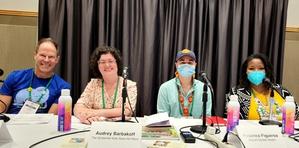On Friday at Children's Institute, booksellers discussed "Activating Literacy with the Entire Family," with panelists Zsamé Morgan from Babycake's Book Stack in Saint Paul, Minn., Audrey Barbakoff of The Collective Book Studio in Oakland, Calif., Federico Figueroa from Secret Garden Books in Seattle, Wash., and John Hutton of Blue Manatee Press in Highland Village, Tex. Panelists agreed that parents should begin reading to their children as soon as possible--perhaps "not in the birthing room, but soon thereafter," joked Morgan.
 |
|
| (l.-r.) John Hutton, Audrey Barbakoff, Federico Figueroa, Zsamé Morgan | |
A large obstacle in children's education is the increase in online learning caused by the Covid pandemic and subsequent lockdown. As an entire generation struggles to engage with reading, parents, in turn, may place the blame upon themselves. Hutton encouraged a more positive outlook: "The plastic age is 0-5, but it's never too late to implement healthier habits and catch up."
It's also important to remind parents that reading is a diverse practice. Graphic novels, audio books, comics, and fanfictions are all valid methods of reading. "Learning lyrics to songs or reading recipes together" can also build positive relationships with words, said Martinez.
Barbakoff recommended booksellers direct parents toward "books that essentially have instructions in them." For example, interactive books such as Press Here by Herve Tullet (Chronicle Books) or Don't Push the Button by Bill Cotter (Sourcebooks Jabberwocky) provide parents with scaffolding for text interaction. If interactive titles aren't enough, parents should "get a stuffed bear and bounce the bear in [their] lap" or ask children to predict what will happen next.
"Effective read-aloud times includes putting in the time," said Martinez. Families can read chapter books together before bed, or pair a young reader's edition with the original adult edition for a cross-age book club.
When waiting for the next book in a series to be published, Figueroa suggested parents "create fanfiction of the stories or create their own comics" to encourage wondering.
Games like Boggle and Scrabble can also build a positive relationship with words. Older kids and teens may build stronger connections with zines, book bingos, or captioned foreign films.
It's also important to remind multilingual families that "there's no requirement to read a book in English just because you're in America," said Hutton. The brain doesn't care what language the book is in, only that there is engagement. Booksellers can support multilingual families by holding culturally specific story times and promoting books by multilingual authors. --Madison Gaines, publishing assistant, Shelf Awareness

